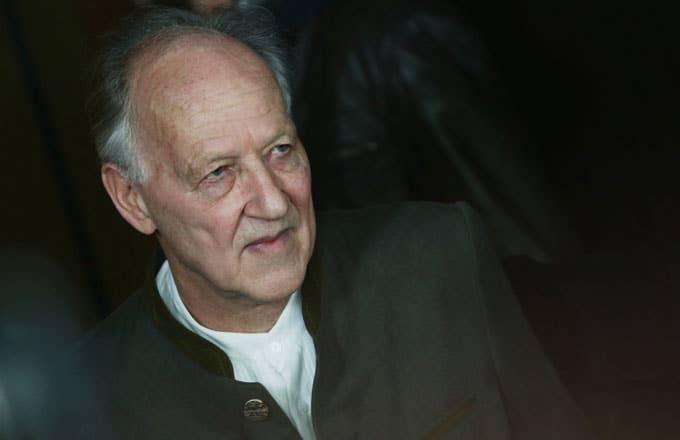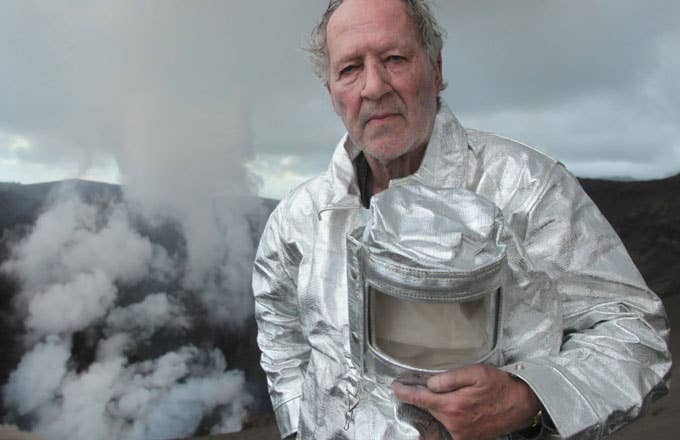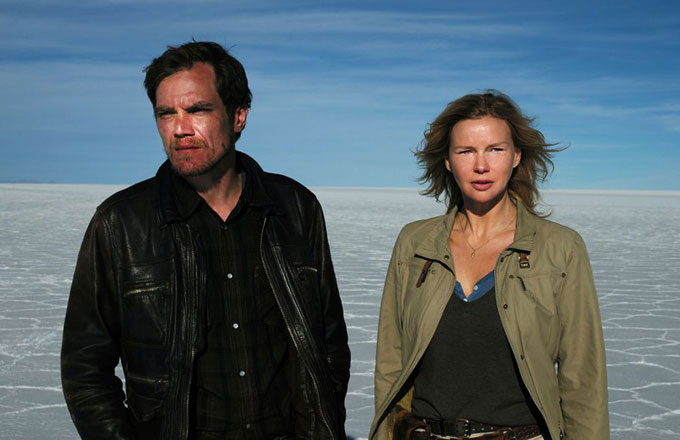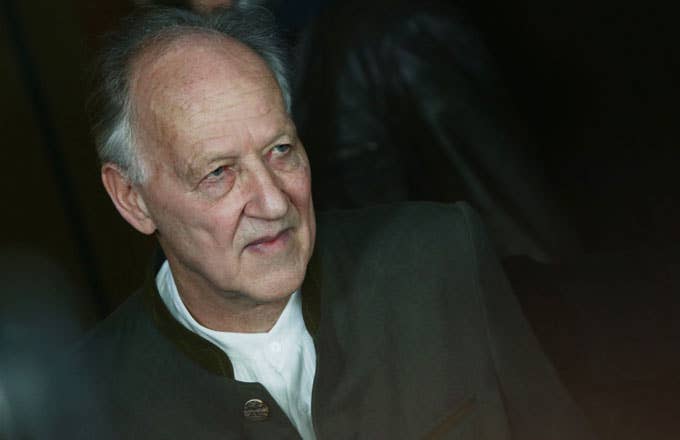
Werner Herzog is the only filmmaker in cinema’s history to have made a film on every continent. It’s a remarkable accomplishment, and when you remind him of this fact, he shudders. “You shouldn’t say it loud,” he told me earlier this year. “Somebody is going to put me in the Guinness Book of World Records, and that would be my deepest embarrassment.”
Herzog’s candor and humor has attracted audiences since he started making movies in the 1960s. To highlight all of Herzog’s abilities would take days. He’s a revolutionary, a chronicler of life, an inimitable free spirit. His documentaries are explorations of the great outdoors—from the grizzlies bears in Alaska to the Chauvet caves in Southern France. His fiction features are explorations of mankind: an ambitious madman who wishes to create an opera house in the jungle, a drug fiend detective in post-Katrina New Orleans, an imperialistic Spanish conquistador. The German auteur is bound by nothing. He goes where his art tells him to.
However, the recent mainstream popularization of Herzog has been a surprise to everyone, especially him. You’ve likely seen (or heard) the septuagenarian discussing Pokemon Go’s potential violence, or providing a live-commentary of Kanye West’s “Famous” music video, or appearing on WTF with Marc Maron. For the past few months, Herzog has been as widely discussed as a Kardashian. Which, if familiar with Herzog’s vast career, is a horrifying and strange image to ponder.
When he spoke with Complex at this year’s Toronto International Film Festival, he was in town promoting his latest two films: one narrative (Salt and Fire, an ecological thriller starring Michael Shannon) and one documentary (Into the Inferno, a gripping deep-dive into active volcanoes). Herzog is one of those people who can seemingly turn anything—even the mundane—into a profound observation, and so the discussion carried onward, touching on everything from the ubiquity of belief systems to jettisoning possessions to why he never directly looks at himself in the mirror.
You say in your new film, “There is no single volcano that isn’t connected to a belief system.”
In principle, when you look at volcanoes around the world, they are almost always connected to some sort of belief system for the local population—to demons, or gods, or whatever. So that was an interesting part for me, not the scientific side—that’s for the scientists.
Do you think we need belief systems?
While they do exist, I personally do not need a belief system. I’d rather figure things out myself.
You find pleasure in thrusting yourself into uncertain situations.
Yes. Or, I would rather say into “something unknown.” New horizons. I’m still curious. I’m still thinking on my own and I’m still following a vision.
Where do you think that grand curiosity comes from?
It’s probably because I grew up in a very isolated valley in the Bavarian mountains.

Did you have siblings?
It’s a complicated family, but it’s basically two brothers, an older and a younger one. They are very, very different from me. My younger brother works running a non-profit foundation—financing, selling rights, organizing. I have just given away all my films and all my books into a foundation.
Why did you do that?
I never cared about possessions—it’s as simple as that. I hardly own anything.
You have those shoes on your feet.
Yes, and the shoes that you see are the only pair of shoes that I own.
One pair?
One pair. Well, I do have sandals, and I do have a pair of heavy boots for hiking and in rock terrain.
Do you have a computer?
Yes, a laptop. It’s a tool. I have a car, which is also a tool.
No cell phone?
I do not have a cell phone. I have a landline which I hardly use. A few books, yes, and what else? In fact, I do not own much.
What’s some of your favorite music?
Oh, don’t ask that.
Let me ask you: When you were doing interviews for Lo and Behold a couple months ago, did you notice the type of interviews you were doing?
I have learned quickly, because there’s a transition now, a mental transition from print media interviews and internet interviews, and it’s interesting because in one case which became viral—
Two cases, actually. You talked about Pokemon Go and then you commented on “Famous,” the Kanye West video.
Let me speak about the rapper first, because I had a fairly interesting conversation with one of these internet reviewers. I don’t even recall what it was. At the very end, she says to me, “Ah, I would like to show you a video! While you see it, can you comment?” I had never heard of it or anything—I even called him Kane West—[but] I found it quite interesting. I said a few things about identity, that you don’t even know how these doppelgangers are created.
Pokemon, equally I had no clear idea. I was told they might meet even in person, neighbors who had never spoken a word meet in the corridors searching for the Pokemon. I poked fun at them, but everybody took it seriously. I said, “When they meet, do they bite into each other’s hand to grab the Pokemon?” Some murder, some violence? So, that went viral. In other words, there’s a completely new form of reception by audiences through the internet, and it is fundamentally different from what you are doing in a print media interview. I’m learning and I’m learning fast.
Are you okay with all of this? Given the fact that you’ve made many vital films, it’s strange to watch the internet flock to your comments on Pokemon Go.
Exactly, and that’s what I have to learn—I’m much more cautious now. I’m not allowing myself to be ambushed, because all of a sudden it reduces half a century of serious filmmaking into some sort of an internet caricature. That is reduced to the question, “Do two people who are chasing Pokemon bite each other in the hand?” This time is over. I do internet interviews, like here in Toronto, but I’m not going to be ambushed. At the same time, I do welcome much of it, as long as it’s a more serious conversation, like with you, because it has an immediacy that you do not have in the print media. It has a different echo out there in the world. It’s not the kind of art-speak sort of print media stuff, which I could never stand.

How do you explain yourself to yourself?
I don’t. I try to avoid it.
No self-reflection?
I don’t like it. I never liked it. I don’t even like to look at myself in the mirror.
What about in the morning, after a shower?
Yes, I shave and I have to look, and I look at, let’s say, my cheek, so that I don’t cut myself, but I don’t look into my eyes.
Why’s that?
I never liked it, I don’t know.
Are you afraid of it?
No. I simply do not like inspection of myself.
Because it feels, what, vain?
No, no, it’s just—some animals have the same reaction. When you put a mirror in front of a dog, you can tell the dog doesn’t like to look at himself.
One last question: What came first, the chicken or the egg?
I don’t know, like anyone, but I’m fascinated because I’m in touch with scientists who are into quantum physics. I don’t like that term because it’s been misappropriated by New Age people, but apparently there are new ways to see the present and the causes and the effects on the present. Apparently, there’s something like a simultaneous up-and-down view. It seems to be probable now that the future, which we do not have yet, has the same effect on the now as the past—very scientifically, in this odd behavior of subatomic particles. They do not behave as our logic and our daily experience tells us. So the chicken and the egg are now at the same moment, and the unlaid egg is already influencing the chicken months before.
Unfortunately, that’s my complicated answer.

